
Meethi Zaban Khushboo
Hasad Shaves Faith
Tirmîdhî narrated from al-Zubayr Ibn al-Awam (Allah be pleased with them) that Prophet (sallallahu alaihi wa-sallam) said… ‘There has come to you the disease of the nations before you… Jealousy and Hatred. This is the Shaver (Destroyer) I do not say that it shaves hair, but that it shaves (destroys) Faith.
Source (Hasan) Jami at- Tirmidhi (2434)
‘Hasad’ can cause the person to indulge in disbelief because it causes the individual to feel that Allah has not been fair with him; he forgets all the Mercy and Blessings that Allah has bestowed upon him. The Messenger of Allah (Sallallahu Alaihi Wa-Sallam) said: They are enemies for Allah’s bounties. The companions asked: ‘Who are they? The Messenger of Allah(sallallahu alaihi wa-sallam) said: ‘Those who envy people for what Allah has given them of Bounty.” [Source at-Tabaranî]
It is reported that Muhammad Ibn. Sirin, [Allah have mercy on him] said: “I have never envied anyone over anything: if a person is going to be in the Fire …how could I envy him over some worldly matter when he is destined for the Fire? And if he is going to Paradise, how could I be envious of a man of Paradise with whom AllahTabaraka wa ta’ala is pleased.”
Muslim said: “We have never heard anything better than this from the words of Ibn Sirin.” [ Source: Abu Bakr Al-Daynuri, Al-Mujalasah wa Jawahir Al-‘Ilm article 2931.]
O Allah, I ask You for knowledge that is of benefit, a good provision, and deeds that will be accepted. Aameen.
Apnay Aamal Ka Muhasba Aur Ukhravi Hisab Ki Tayari
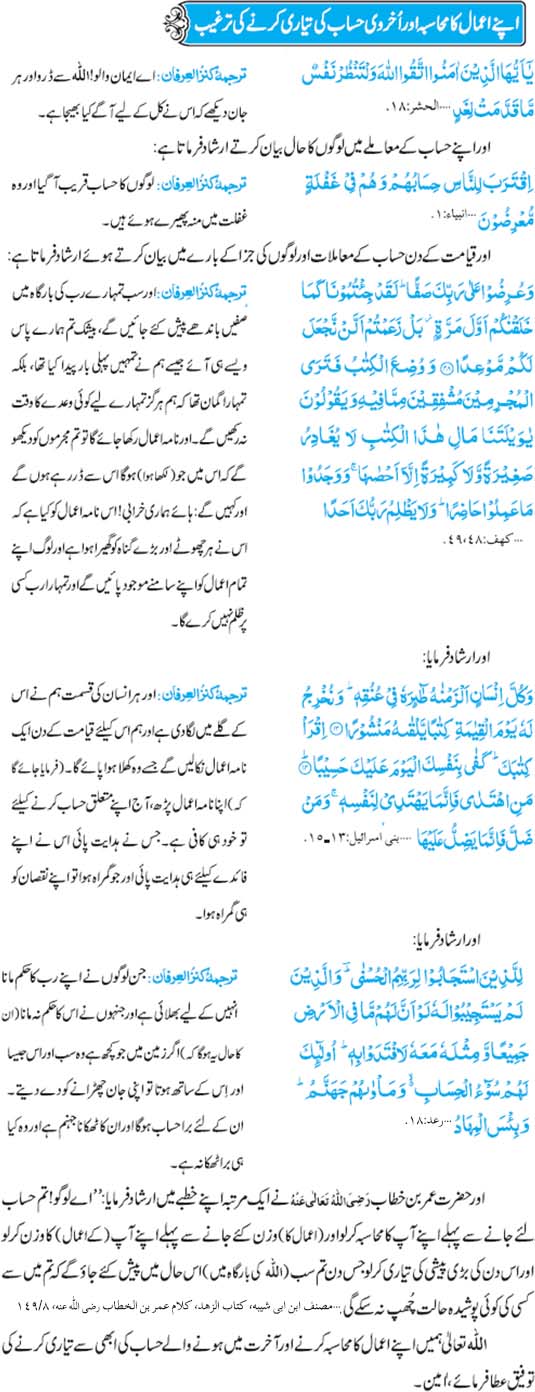
Apnay Aamal Ka Muhasba Aur Ukhravi Hisab Ki Tayari
The Healing Of Honey
More than 1,400 years ago, Allah All-Mighty told us through His Messenger sallallaahu `alayhi wa sallam (may Allah exalt his mention) that honey can heal a variety of medical problems. Honey is a remarkable viscous liquid, prepared by bees from nectars of various plants. It has occupied a prominent place in traditional medicine throughout history. The ancient Egyptians, Assyrians, Chinese, Greeks, and Romans employed honey for different diseases.
The Noble Quran and many Prophetic narrations refer to honey as a great healer of disease. Allah, Almighty, Says (what means): “And your Lord inspired the bee, saying: “Take you habitations in the mountains and in the trees and in what they erect. Then, eat of all fruits, and follow the ways of your Lord made easy (for you).” There comes forth from their bellies, a drink of varying colors wherein is healing for men. Verily, in this is indeed a sign for people who think.” [Quran; 16: 68-69]
Abu Saeed Al-Khudri may Allah be pleased with him related that a man came to the Prophet sallallaahu alayhi wa sallam ( may Allaah exalt his mention ) and said: “My brother has some abdominal trouble.” The Prophet sallallaahu alayhi wa sallam ( may Allaah exalt his mention ) said to him “Let him drink honey.” The man returned to the Prophet sallallaahu alayhi wa sallam (may Allah exalt his mention) and said: “O Messenger of Allah! I let him drink honey, but it caused him more pain.” The Prophet sallallaahu `alayhi wa sallam (may Allah exalt his mention) said to him: “Go and let him drink honey!” The man went and let his brother drink honey, then returned and said: “O Messenger of Allah, it did not cause him except more pains.” The Prophet sallallaahu alayhi wa sallam (may Allah exalt his mention) then said: “Allah has said the truth, but your brother’s abdomen has told a lie. Let him drink honey.” So he made him drink honey and he was cured. [Al-Bukhaari and Muslim]
The Prophet sallallaahu `alayhi wa sallam (may Allah exalt his mention) also said: “Make use of the two remedies: honey and the Quran.” [At-Tirmithi, Ibn Maajah, and Al-Bayhaqi] Modern medicine is only just learning of this fact.
Benefits of honey:
1. Alleviates inflammation of the cornea if used locally on the eye.
2. An antibiotic if used locally in situations of wounds and burns, and it is used for healing of wounds:
§ In the case of wounds, honey absorbs moisture from the air, facilitates the healing process, and prevents scarring. This is because honey stimulates the growth of epithelial cells that form the new skin cover. In this way, honey may eliminate the need for tissue transplantation.
§ Honey stimulates the re-growth of tissue involved in the healing process. It stimulates the formation of new blood capillaries and the growth of fibroblasts that replace the connective tissue of the deeper layer of the skin and produce the collagen fibers that give strength to the repair.
§ Honey has an anti-inflammatory action, which reduces the swelling around a wound. This improves circulation and thus hastens the healing process.
§ Honey does not stick to the underlying wound tissues, so there is no tearing away of newly formed tissue, and no pain when dressings are changed.
§ Thanks to its antimicrobial properties, honey provides a protective barrier to prevent wounds from becoming infected. It also rapidly clears any existing infection from wounds. It is fully effective, even with antibiotic-resistant strains of bacteria.
§ Some studies showed that honey is a good treatment against the hospital infection bacteria “superbugs” (MRSA.)
3. As honey does not accommodate bacteria, this bactericide (bacteria-killing) property of honey is named “the inhibition effect.” There are various reasons for this anti-microbial property of the honey. Some examples are the high sugar content that limits the amount of water microorganisms need for growth, its high acidity (low pH), and its composition which deprives bacteria from nitrogen necessary for reproduction. The existence of hydrogen peroxide as well as antioxidants in the honey prevents bacteria growth.
4. Antioxidant: Those are the components in cells that get rid of harmful byproducts of normal metabolic functions. These elements inhibit destructive chemical reactions that cause spoilage of food and many chronic illnesses. Researchers believe food products rich in antioxidants may prevent heart problems and cancer. Strong antioxidants are present in honey: Pinocembrin, pinobaxin, chrisin, and galagin. Pinocembrin is an antioxidant that merely exists in the honey.
5. A treatment for gastric and duodenal ulcers, as honey decreases the secretion of hydrochloric acid to a normal rate, thus helping to heal such ulcers alleviate the related pains, and reduce resultant cases of vomiting and colic. For the treatment to be effective, honey should be taken dissolved in warm water one or two hours before meals.
6. A treatment for involuntary urination at beds. So, if the child is given one small spoon of honey before sleeping, this will have a positive effect, as honey is a sedative for the nervous system, thus helping the cyst to relax and expand during sleep.
7. It supports blood formation: Honey provides an important part of the energy needed by the body for blood formation. It helps in cleansing the blood. It has some positive effects in regulating and facilitating blood circulation. It also functions as a protection against capillary problems and arteriosclerosis.
8. A treatment for colds, flu, and pharyngitis.
9. A treatment for cases of chronic hepatitis, as honey increases the liver stock of glycogen material through the increase of blood glucose, thus helping the liver function properly and relieve it from more burdens.
10. A treatment for insomnia and a sedative for nerves, as it contains some sedative and tonic substances as sodium and potassium at a reasonable rate such.
11. A treatment for alcoholic poisoning. Fructose and vitamin B group in the honey help oxidize the alcohol remaining in the body.
12. A treatment for cough.
13. In cosmetics, a mixture of honey with lemon and glycerin is considered the best old medical prescription for the treatment of skin cracking and roughness, inflammation, and wounds of lips, sunstroke, and dermal pigments.
14. A treatment for muscular spasms of sportive exercises or facial spasms and eyelid muscles, which disappear after having one big spoon of honey for three days after each meal.
15. Has a low calorie level. When it is compared with the same amount of sugar, it gives 40% fewer calories to the body. Although it gives great energy to the body, it does not add weight. Furthermore, the use of honey is safe and has no allergic or side effects.
The Prophet sallallaahu alayhi wa sallam ( may Allaah exalt his mention )was right in his prescription for the ailing man. When the fourth treatment of honey was given to the man, he got better. Such is part of the knowledge that the Almighty has revealed to His Prophet sallallaahu `alayhi wa sallam may Allah exalt his mention).
Sahaba Karam Ki Nazar Mein Sunnat
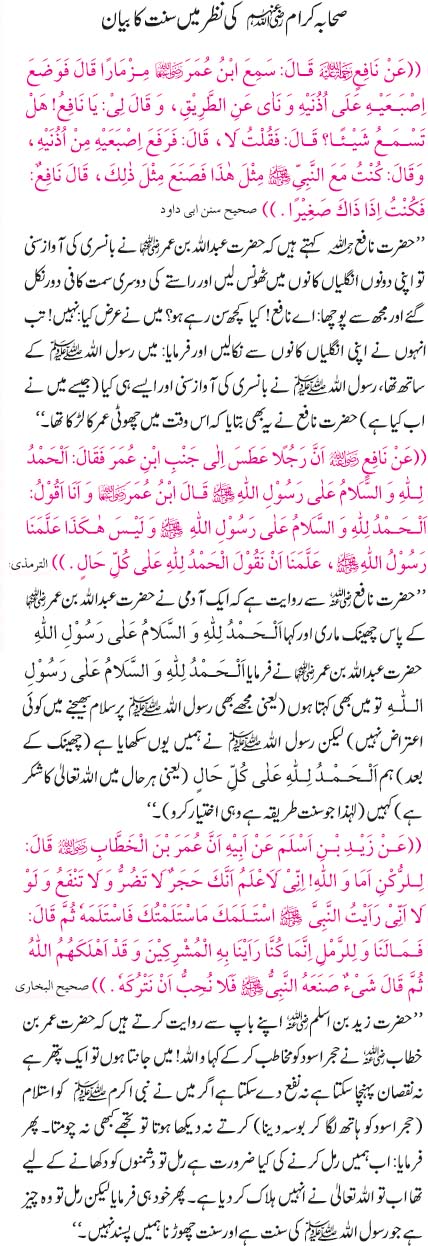
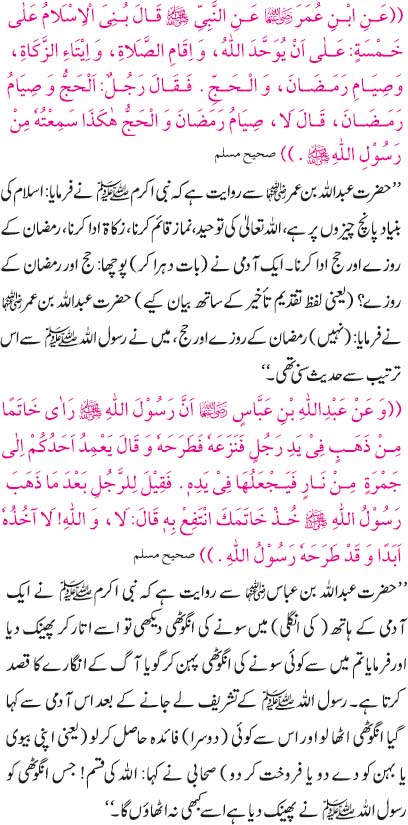
Sahaba Karam Ki Nazar Mein Sunnat
Fasting Six Days Of Shawwal After Ramadan
Sayyiduna Ayyub (Allah be pleased with him) relates that the Messenger of Allah (blessings and peace be upon him, his family, and companions) said, “Whoever fasts Ramadan and follows it with six days from Shawwal it is as if they fasted the entire year.” [Muslim, Abu Dawud, Tirmidhi, and Ibn Majah; Ahmad transmitted it from Jabir, Muntaqa]
Sayyiduna Thawban (Allah be pleased with him) relates that the Messenger of Allah (blessings and peace be upon him, his family, and companions) said, “Whoever fasts Ramadan, and then six days after Eid, it is an entire year. Whoever does a good deed shall have ten times its reward.” [Ibn Majah, Muntaqa]
Important Notes:
1. Based on this, the majority of the fuqaha, including the Hanafi, Shafi`i, and Hanbali school, have held that it is recommended to fast six days of the month of Shawwal. [Radd al-Muhtar; Mughni al-Muhtaj Shah al-Minhaj; Kashshaf al-Qina]
- It is permitted to fast these six days separately throughout the month, or consecutively, after Eid al-Fitr.
-
It is prohibitively disliked (makruh tahriman) and sinful to fast on Eid day itself. [Radd al-Muhtar]
-
The Shafi’is and Hanbalis state that it is superior to make the six fasts consecutive[Minhaj, Ghayat al-Muntaha]. Khatib al-Shirbini explains the reasoning as being,
“To hasten to do the good, and because of the problems inevitable in delaying,”
such as becoming lazy and not fulfilling this sunnah in the end, though he points out that the sunnah is fulfilled by both consecutive and non-consecutive fasting of six days in Shawwal. [Mughni al-Muhtaj]
The later Hanafi scholars differed as to which is better, fasting the six days consecutively or non-consecutively, though neither is disliked and both fulfill the sunnah. [Radd al-Muhtar]
However, it would be agreed that those who fear not fulfilling the recommendation due to laziness, forgetfulness, or other excuses, should hasten to fast the six days consecutively immediately after Eid al-Fitr.
- The reward is akin to having fasted obligatory fasts the entire year days, according to Buhuti, Shirbini, and others.
Sayyiduna Abu Hurayra (Allah be pleased with him) said that the Prophet (Allah bless him & give him peace) said, “The strong believer is better and more beloved to Allah than the weak believer, though there is good in both. Be avid for that which benefits you. Rely on Allah and do not deem yourself incapable…” [Muslim:4816, Ibn Majah:76, Ahmad:8436]
Imam Nawawi (Allah have mercy on him) explained that the ‘strength’ in this hadith refers to, “One’s determination and ability in matters of the next life.”
And Allah alone gives success!!
References:
Ibn Abidin, Radd al-Muhtar ala al-Durr al-Mukhtar, Vol. 2, Page 125
Shirbini, Mughni al-Muhtaj Sharh al-Minhaj, Vol. 2, Page 184-185
Buhuti, Kashshaf al-Qina, Vol. 2 Page 237-238
Taqwa Ka Mafhoom
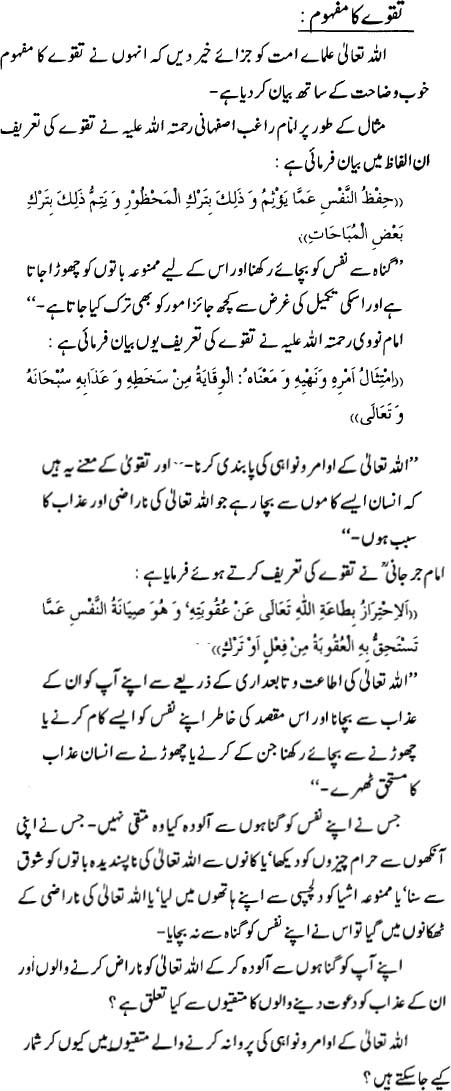
Taqwa Ka Mafhoom
Jannat-ul-Baqi
The most pious and spiritual graveyard of the world is called, “Jannat-ul-Baqqi” where several companions (RA), wives daughters, and other family members of Prophet Muhammad sallalla ho allihi wasallam are lying to rest. In the time of Prophet sallalla ho allihi wasallam live hood, this graveyard was thought to be outside Madina City but after the vast extension, it has now come just adjacent to Masjid-e-Nabvi. If you come out from Masjid-e-Nabvi, through Baqqi Gate, or Jibrael (AH) Gate you will see a few yards ahead a boundary wall at a little height. This is JANNAT -UL -BAQQI’S wall. Stairs are made to reach the height.
Men can visit this graveyard going inside but ladies are not allowed even to go up near the wall of the graveyard. Ladies must present their Salaam outside Baqqi. Baqqi is a very clean and tidy graveyard. No bush or tree is there. All the graves are made of mud. No concrete constructions over the graves are made. Pavement and passages are made for easy walking but there is no sign over the graves have been given to know the name of the buried personality. Some guides (Moaleems) tell about graves. A squared boundary of half a foot high has been built around all prominent graves.
People must visit this graveyard with great respect as many great personalities are lying to rest here.
When you enter inside “Baqi”, a few feet ahead, slightly on your right you will see the graves of the daughters of prophet sallalla ho allihi wasalam .Three daughters named Syeda Umm-e-Kulsoom, Syeda Ruqiya, and Syeda Zainab Raddi Allah ho ta’ala Anhuma are buried here. A few steps ahead you may find nine graves of the wives of the Prophet (S. A. W.) including Syeda Ayesha Radi Allah ho talla anha.These graves are combined. After entering in Baqqi cemetery, if you take a left turn and come to the corner near the boundary wall you will find the grave of the closest aunt of Prophet (S. A. W.) Syeda Safia (RA). If you walk straight you will find the grave of Prophet’s (S.A.W) little son Syedna Ibrahim (RA). This is a smaller grave in size and pilgrims may recognize it easily.
If you take a right turn just entering to jannat-ul-baqi you will find the grave of prophet sallalla ho allihi wasallams’ grandson Syedna Hasan (RA). He is buried along with other family members of the prophet sallallaho allihi wasallam. The graves of Syedna Abbas (uncle of the prophet) and other imams like Syedna Baqar R.A and Jafar Sadiq R.A are also situated beside the grave of Syedna Hasan radi Allah ho talla anho. The beloved daughter of the prophet Muhammad sallalla ho allihi wasalam and the lady of Janna (Heaven) “Fatima -ul-Zuhra (RA)” is also lying rest just adjacent to these graves. In the last, almost crossing whole the graveyard, you may find the grave of the most respectable personality in this graveyard, “Syedna Usman (RA) “. Slightly on the left, a little before the grave of Syedna Usman Raddi Allah ho talla Anho, there is a grave of ” Syeda Haleema (RA)” who fed Prophet (S. A. W.), when he was an infant.
Few Important And Holy Graves In Jannat-Ul-Baqi
Grave of Hazrat Ibrahim R.A. (Son of Prophet Mohammed P.B.U.H.) He was the beloved son of prophet sallalla ho allihi wasallam. He passed away in his childhood. His mother was um-ul-momeeneen Syeda Maria Qutbia who herself lying to rest in Jannat-ul-Baqqi
Grave of Syedna Osman R.A. This is the holy grave of the 3rd caliph and beloved companion of Prophet Muhammad sallallaho allihi wasallam. this grave is known as the most sacred grave of Jannat-ul-Baqqi.
Grave of Hazrat Haleema R.A. Syeda Haleema Sadia got the honor to feed her milk to beloved prophet Hazrat Muhammad sallallaho allihi wasallam when he sallallalho allihi wasallam was handed over to her. According to Arabic custom an infant just after his birth had been handed over to a nurse or governess for better care in the open and healthy atmosphere outside the city. Syeda Haleema Sadia belonged to bnnu saad(saad family)
Grave of wives of Prophet Muhammad Sallalla Ho Allihi Wasallam (AZDAWAJ-E-MUTHARAT)
Almost all the wives except Syeda Khadeeja R.A are lying rest here in Jannat- ul-Baqi.Ummul momeeneen bibi Ayesha Siddiqa radi Allaho talla anha and Syeda Mariya Qutbia radi Allaho talla anha are also buried among
these graves
Grave of Hazrat Safia R.A. Syeda Safia was the only confirmed aunt (fathers’sister) of prophet Muhammad sallallaho allihiwasallam who embraced Islam. she used to love her nephew very much. She was a brave woman. she was accompanied with the soldiers of Islam in the battle of Uhad. she worked in this battle as a kind-hearted nurse. she used to clean wounds and bandage over them. she supplied and helped injured soldiers of Islam to
drink water on the battlefield.
on extreme left —-grave of Syeda Safia radi Allah o tala anha in middle—– grave of Atika on right—-grave of Ummul-Baiza last two are also aunt of prophet sallallaho allihi wasallam. it is said that they had also embraced Islam in the last stage but it is not confirmed. Their graves in Jannat ul baqi may be proof that they had mighty accepted Islam
Graves of daughters of Prophet Muhammad Sallalla Ho Allihi Wasallam
No1. Syeda Zainab R.A
No2. Syeda Umm-e-Kulsoom R.A
No3. Syeda Ruqayia R.A
Graves of Ahl-e-Bait (prophet family graves)
Here is the grave of Syedna Hasan radi Allah ho talla annho who was the beloved grandson of prophet Muhammad sallalla ho allihi wasallam.For Syedna Hasan and Syedna Hussain R.A, prophet salla ho allihi wasallam used to say that those are two flowers of heaven
Grave of Syedna Abbas Radi Allah Tala Anhoo.Real uncle of Prophet Sallalla Ho Alihi wasallam
He was the one out of 2 uncles of Prophet sallalla ho allihi wasallams’who embraced Islam. Other one is Syedna Hamza R.A, who is buried on the battlefield of Uhad in Madina munawarrah.
Grave of Syedna Jaffar-Tayyar Cousin of Prophet Sallalla Ho Alli Hi Wasallam
Grave of Syedna Imam Hasan Radi Allah-O-Annho and 4 other Imams
The lonely grave on the left is of Syedna Imam Hasan RadiAllah-o-Talla Anho the beloved grandson
Hukmrano Aur Awam Kay Haqooq
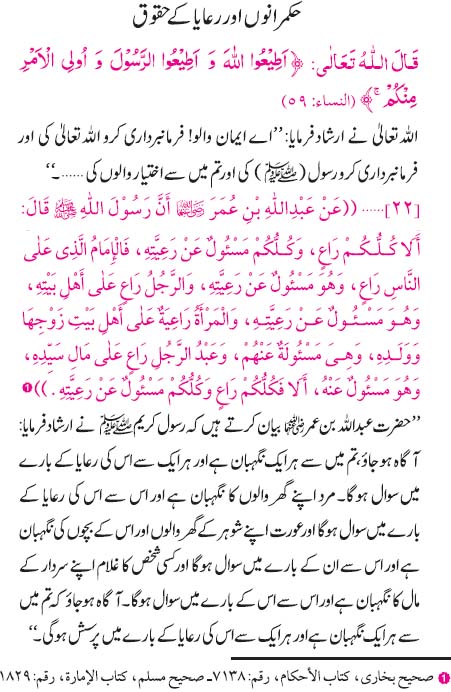
Hukmrano Aur Awam kay Haqooq
Ibn-e-Adam Claims: My Wealth, My Wealth
[24. Surah Sura An-Nur: Ayah 56] And keep up prayer and pay the poor-rate and obey the Apostle, so that mercy may be shown to you.
[Sahih Muslim: Book 5, Book Name Kitab Al-Zakat, Number 2277] Abu Huraira (Radi Allah Anhu) reported from the Messenger of Allah (sal-allahu-alleihi-wasallam) as having said this: “The heart of an old person feels young for the love of two things: love for long life and wealth.”
[Sahih Muslim: Book 5, Book Name Kitab Al-Zakat, Number 2279] Anas (Radi Allah Anhu) reported Allah’s Messenger (sal-allahu-alleihi-wasallam) as saying: “The son of Adam grows old, but two (desires) in him remain young: desire for wealth and desire for life.”
[Sahih Muslim: Book 5, Book Name Kitab Al-Zakat, Number 2282] Anas (Radi Allah Anhu) reported Allah’s Messenger (sal-allahu-alleihi-wasallam) as saying: “If the son of Adam were to possess two valleys of riches. he would long for the third one. And the stomach of the son of Adam is not filled but with dust. And Allah returns to him who repents.”
[Sahih Muslim: Book 5, Book Name Kitab Al-Zakat, Number 2285] Ibn Abbas (Radi Allah Anhu) reported Allah’s Messenger (sal-allahu-alleihi-wasallam) as saying: “If there were for the son of Adam a valley full of riches, he would long to possess another one like it. and Ibn-e-Adam does not feel satiated but with dust. And Allah returns to him who returns (to Him).”
[Sahih Muslim: Book 42 “Kitab Al-Zuhd wa Al-Raqa’iq”, Number 7061] Mutarrif (Radi Allah Anhu) reported on the authority of his father: I came to Allah’s Apostle (sal-allahu-alleihi-wasallam) as he was reciting: “Abundance diverts you” He said (sal-allahu-alleihi-wasallam): “The son of Adam claims: My wealth, my wealth. And he (the Holy Prophet) said: O son of Adam. is there anything as your belonging except that which you consumed, which you utilized, or which you wore and then it was worn out or you gave as charity and sent it forward?”
[Sahih Muslim: Book 42 “Kitab Al-Zuhd wa Al-Raqa’iq”, Number 7063] Abu Huraira (Radi Allah Anhu) reported Allah’s Messenger (sal-allahu-alleihi-wasallam) as saying: “A servant says, My wealth. my wealth, but out of his wealth three things are only his: whatever he eats and makes use of or by means of which he dresses and it wears out or he gives as a charity, and this is what he stored for himself (as a reward for the Hereafter), and what is beyond this (it is of no use to you) because you are to depart and leave it for other people. This hadith has been narrated on the authority of al-‘Ala’ b. ‘Abd al-Rahman with the same chain of transmitters.”
[Sahih Muslim: Book 42 “Kitab Al-Zuhd wa Al-Raqa’iq”, Number 7064] Anas b. Malik (Radi Allah Anhu) reported Allah’s Messenger (sal-allahu-alleihi-wasallam) as saying: “Three things follow the bier of a dead man. two of them come back and one is left with him: his family members. wealth and his good deeds. The members of his family and wealth come back and the deeds alone are left with him.”

